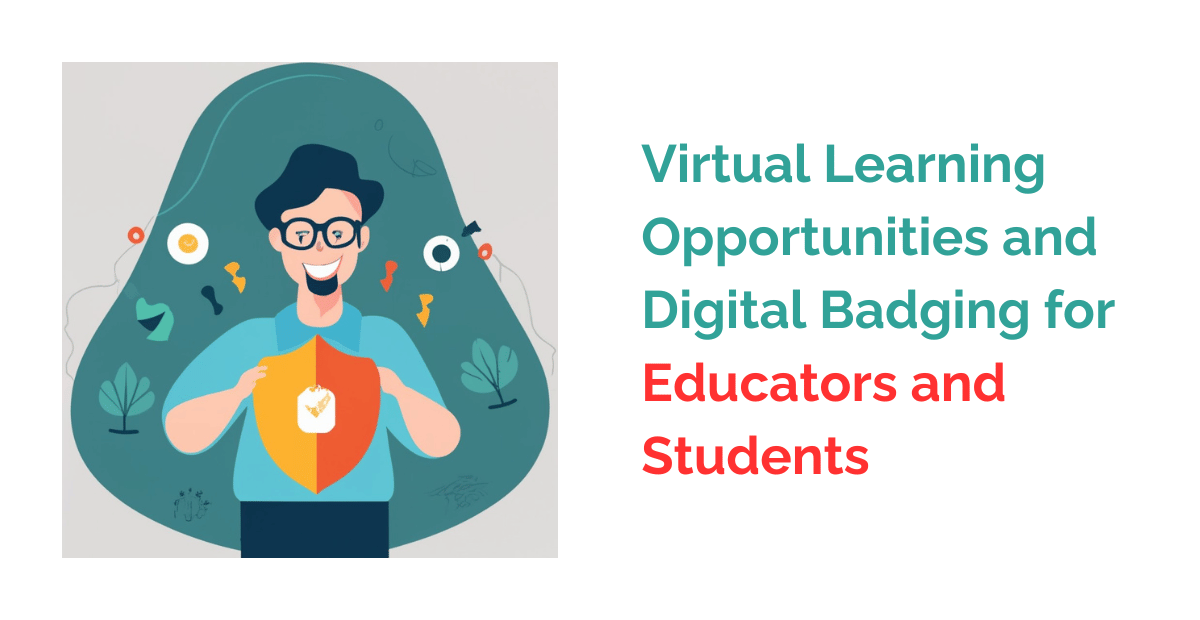Virtual Learning Opportunities and Digital Badging for Educators and Students
The integration of technology and the availability of virtual learning opportunities have transformed the way educators teach and students learn. Additionally, the concept of digital badging has emerged as a powerful tool to recognize and validate the skills and knowledge acquired through online learning experiences. In this blog, we will explore the world of virtual learning opportunities and how digital badging can benefit both educators and students.
Virtual Learning Opportunities for Educators
-
Professional Development: Virtual learning offers educators a wealth of opportunities for professional development. They can access online courses, webinars, and workshops from the comfort of their homes, enabling them to stay updated with the latest teaching methodologies and educational trends.
-
Global Collaboration: Virtual platforms allow educators to collaborate with colleagues from around the world. This global perspective can enrich their teaching strategies and expose them to diverse perspectives and teaching methods.
-
Flexibility: Virtual learning is inherently flexible, allowing educators to choose when and where they engage in learning activities. This flexibility is crucial for busy teachers who juggle teaching, grading, and other responsibilities.
-
Resource Accessibility: Online repositories and libraries provide educators with a vast array of teaching resources, including lesson plans, multimedia materials, and research articles. These resources can enhance the quality of their teaching.
-
Customized Learning: Virtual learning platforms often offer personalized learning experiences. Educators can select courses that align with their specific needs and interests, ensuring that they gain knowledge and skills relevant to their roles.
Digital Badging for Educators
Digital badging is a system of awarding badges to individuals for acquiring specific skills or completing particular achievements. Here’s how it can benefit educators:
-
Skill Recognition: Digital badges provide tangible recognition for the skills educators acquire through virtual learning. These badges serve as digital credentials that can be displayed on social media profiles, resumes, and portfolios.
-
Motivation: The pursuit of badges can motivate educators to engage in continuous professional development. The desire to earn a badge can drive them to explore new topics and enhance their teaching skills.
-
Competitive Advantage: Educators with a collection of relevant digital badges may have a competitive advantage when seeking promotions or new job opportunities. These badges demonstrate their commitment to ongoing learning.
-
Portfolio Building: Digital badges can be displayed in a digital portfolio, which can showcase an educator’s expertise and growth over time. This portfolio can be a powerful tool during performance evaluations and job interviews.
Virtual Learning Opportunities for Students
-
Accessibility: Virtual learning eliminates geographical barriers, allowing students from different parts of the world to access quality education. This accessibility is especially beneficial for those in remote or underserved areas.
-
Diverse Learning Formats: Students can choose from a wide range of virtual courses, from traditional lectures to interactive simulations and multimedia-rich content. This variety caters to diverse learning styles and preferences.
-
Self-Paced Learning: Virtual learning often permits self-paced learning, enabling students to progress at their own speed. This flexibility is particularly useful for students with varying levels of prior knowledge.
-
Cost-Efficiency: Virtual courses are often more cost-effective than traditional brick-and-mortar education. Students can save on commuting, accommodation, and textbook expenses.
-
Global Networking: Virtual classrooms provide opportunities for students to connect with peers from different countries and cultures. This global networking can broaden their horizons and foster international collaborations.
Digital Badging for Students
Digital badging can also greatly benefit students:
-
Skill Validation: Digital badges serve as proof of skills and knowledge gained through virtual learning. These badges can be shared on social media or added to resumes to showcase their competencies to prospective employers or colleges.
-
Motivation: The prospect of earning badges can motivate students to excel in their studies and engage more actively in virtual learning experiences. It provides a sense of achievement and progress.
-
Lifelong Learning: Digital badges encourage a culture of lifelong learning. Students are incentivized to pursue continuous education and skill development beyond traditional classroom settings.
-
Career Readiness: Accumulating a collection of relevant badges can make students more competitive in the job market. It demonstrates their commitment to acquiring practical skills and staying updated in their chosen field.
In conclusion, virtual learning opportunities and digital badging are powerful tools that have the potential to transform education for both educators and students. They provide flexible, accessible, and personalized learning experiences, while digital badges offer tangible recognition and motivation to continuously acquire new skills and knowledge. As the world of education continues to evolve, embracing these opportunities can help educators and students thrive in a digital age.

 Author :
Author : 







